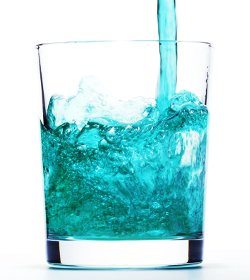
At one point or another everyone has suffered the confidence-crushing blow of having bad breath. Though chronic bad breath may be the cause of a serious condition in the body, most times it’s a simple case of poor hygiene. In any event it can lead to serious anxiety.
From a young age we’ve had it drilled into our heads, and mouths, that rinsing with mouthwash is the best way to combat said bad breath or halitosis. While this may be partially true, it’s also a great way to help keep your smile healthy.
Regular use of mouthwash arms you with some tried and true tools that can help you tend to the health of your teeth, gums and the soft inner lining of the mouth. Here are just a few benefits you’ll gain from a quick rinse:
Read more: Mouthwash, What It Is, and How It Works
How Mouthwash Helps with Plaque
Most dentists agree that mouthwash alone won’t reduce the amount of plaque you currently have, but there is evidence to suggest that rinsing with mouthwash can prevent plaque from building up in the first place.
Backing up just a bit, plaque is the hard substance that forms over your gums, in-between teeth, and on the surface of your teeth. Let it build up for too long and it can do some serious damage in the form of cavities and gum disease.
So after you make your next visit to the dentist and have all the plaque scraped from your pearly whites, mouthwash can help prevent it from reforming.
With certain kinds of mouthwash (like Listerine Agent Cool Blue Pre-Brush Tinting Rinse) you can actually target and remove plaque. While many of these tinting rinses are marketed to kids, helping them form good brushing habits, they are great for adults too! Any area with a large amount of plaque will light up with color so you can concentrate your brushing and flossing efforts there.
Mouthwash Can Help To Remove Food Particles
If you’re like most people, you may be operating under the guise that mouthwash is to be used only after brushing. We’re here to tell you that mouthwash is also effective when used before brushing to rinse out any loose particles in your mouth giving your brushing and flossing efforts a head start.
By loosening any hidden particles, you have a better chance of removing them while you’re brushing and flossing, thus avoiding any potential cavity snafus. You also enhance your good hygiene habits by preventing additional plaque from forming and helping to slow the growth of germs and bacteria.
Still not willing to part with your post brush-floss-rinse routine? Don’t worry. You’re always welcome to do a second rinse of mouthwash after you brush and floss too.
Mouthwash Aids in the Prevention of Cavity Formation
So we’ve established that regular use of mouthwash before and/or after you brush and floss is a great idea. Did you also know rinsing can also reduce the chances of a cavity forming in the first place? If you’re looking for a little extra help in this department, choose a mouthwash that contains fluoride as an ingredient (not all of them do—so check the label).
Doing so can strengthen your enamel, prevent cavities and strengthen your enamel. After all, there’s a reason why some countries choose to put it in their water supply.
What Does Mouthwash Do?
It’s important to note that there are two distinct categories of oral rinses: cosmetic and medicinal. Cosmetic mouthwash helps with bad breath by leaving a pleasant minty taste and scent in the mouth. Depending on the formulation, therapeutic or medicinal mouthwashes can be purchased without a prescription. Plaque and cavities can be prevented and oral hygiene is improved with the help of a therapeutic mouthwash.
Are There Any Drawbacks to Using Mouthwash?
Including mouthwash in your regular oral care practice is risk-free and beneficial. Still, nothing can take the place of a good brushing and flossing routine. The use of a mouth rinse is a terrific way to boost your dental hygiene routine and maintain a sparkling smile.
Should You Add a Mouth rinse to Your Daily Oral Hygiene Routine?
A quick yes is the simplest answer. If you want you and your family to have clean teeth and healthy gums, mouthwash is a great dental item to use. You can use mouthwash either before or after your regular brushing and flossing routine.
Benefits of Mouthwash
Freshens Breath
This is often the number one motivation for patients to use mouthwash: to eliminate bad breath. After 30 seconds of rinsing, your mouth will feel and taste as fresh as a mint leaf. If you’re going to be addressing an audience or engaging in face-to-face conversation, rinsing your mouth with a minty fresh mouthwash is a good idea.
Reduces Sensitivity
In addition to preventing cavities, the sensitivity of your teeth may be reduced by using a mouth rinse that contains fluoride. Increased fluoride levels have been shown to reduce tooth sensitivity by covering up vulnerable enamel.
Reduces Dry Mouth
Did you know, that the salivary glands can be prompted into action by using mouthwash?
Whitens Teeth
Whitening agents like hydrogen peroxide are sometimes found in certain types of mouthwash which can aid in whitening teeth in a safe and effective way.
Mouthwash does not replace brushing and flossing but it is a great step to add to your dental routine that can assist with many other things. Keep in mind, alcohol-free mouthwash is recommended. And remember, brush, floss and rinse twice a day!
In the end, while our old friends brushing and flossing are still the best ways to prevent oral issues from taking hold, adding mouthwash into a routine is an effective way to ward off things like tooth decay and gingivitis, while promoting healthy teeth and gums.




